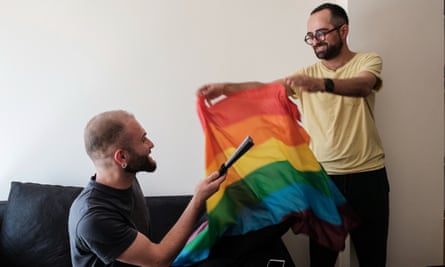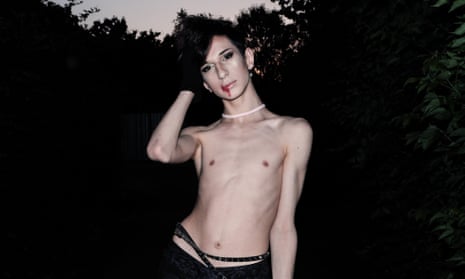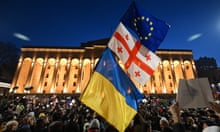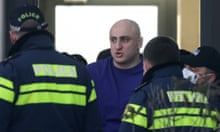Six years on, the violent scene remains imprinted in the minds of Georgia’s LGBT community: dozens of gay rights demonstrators being beaten in the streets of Tbilisi by black-frocked priests and far-right protesters, some bearing clubs and other weapons. The modern-day pogrom in 2013 seemed like a warning: whatever Georgia’s aspirations to join Europe, its queer community would be left behind.
But this week activists are planning the country’s first LGBT pride events in a gambit to convert the underground explosion of queer culture in Georgia into political change. Arrayed against them are conservative and Christian activists and a police force that says they can’t guarantee the safety of the protesters. Many fear the violence of 2013 could be repeated.
“Pride is always controversial,” said Giorgi Tabagari, one of the organisers of this year’s events, which will conclude with a “dignity march”. “But how long can we hide? If we saw government was effective at combating homophobia and moving in a different direction, maybe there would not be a need for us to do a risky decision like pride. But we need to decide whether to remain with the status quo or to push harder.”

An ex-Soviet state nestled in the South Caucasus, Georgia usually finds its way into headlines for its ongoing conflict with Russia or, lately, as a tourist haven with a booming culinary scene. The Georgian Orthodox church, the most trusted institution in the country according to polls, wields enormous power and wants to see the country remain a bastion of conservatism.
“It’s a bit like a theocracy,” said one person close to the government, who asked not to be named. Georgia’s patriarch this week called for authorities to block pride, accusing anti-homophobia groups of promoting the “sin of Sodom”. Police detained nine people on Friday after conservative activists attacked a pro-LGBT rally in downtown Tbilisi.
The preparations for pride have sparked a national conversation and controversy within the LGBT community. The group has released videos with young gay, lesbian, and transgender people and allies stating openly that they support the event, a bold show of support that risks the public shaming and cyberbullying of them and their families.
“Coming out is a very courageous thing for people to do,” said Tabagari, who estimated that 500,000 people in a country of 3.5 million have seen the videos. “When you start speaking in the first person, you trigger empathy. You get more supporters. We hope the majority get used to the idea that there are queer people around you.”
Every time he comes to Tbilisi, a 17-year-old who goes by the name Drago Flowers queues for the bus in Rustavi, 30 minutes away. Rail-thin with dyed hair, rainbow eyeshadow and tattooed legs, he’s targeted so often with homophobic slurs and violence that he’s become a regular in the local police station.
“I’d rather be beaten up than hide who I am,” said Flowers. “Hiding it would be torture.”
A video blogger who dreams of moving to New York one day, for now he focuses on his work as a make-up artist and performing in drag shows in some of Tbilisi’s gay-friendly clubs, where he claims to be the only person capable of doing a death drop, an acrobatic move popular in a dance form called Vogue.
He says he plans to attend pride. But is the country ready?
“Maybe in 100 years,” he joked.

Club culture has led to this moment. Several of Tbilisi’s underground clubs have become incubators for political and equality movements, and police raids against the largest nightclub, Bassiani, sparked a protest movement called “White Noise,” a cross between a block party and street protest calling for drug decriminalisation.
Alongside Bassiani’s Horoom parties, LGBT nights where attendees must past an online screening and are banned from taking photographs, Flowers also named the club Success Bar as one of the few, new safe spaces in the city for queer people and allies to mingle.
The party only gets started after midnight at Success Bar, a subterranean space inspired by the Berlin gay bars Roses and Barbie Deinhoff. Nia Gvatua, the owner, offers a glass of champagne as she recalls her pitch to a friendly businessman to open a gay bar. He immediately handed her $20,000 (£15,700) in cash. Since then, she’s been robbed, raided and picketed, all while Success Bar has grown to become part of the LGBT community.

“I’ve seen people go from hiding in the corner in Success to being more open and confident. I see progress,” said Gvatua. “Some things have changed since 2013. There was no Bassiani. There was no Success Bar like this. There was no anti-discrimination law.”
While activists claim that Georgia has become more liberal since 2013, their opponents have been working to make it more conservative. After 2013, the church named 17 May “Family Values Day,” holding marches on the same day that LGBT groups organise anti-homophobia demonstrations. Far-right parties, like the neo-fascist Georgian March, have promised to disrupt any attempt to hold a Tbilisi pride, blaming the liberal bogeyman George Soros.
Tabagari said that LGBT people had become a popular target for fringe parties that want to gain visibility.
“I view this as a clear and present danger,” Levan Vasadze, a wealthy Georgian businessman who is close to the church, said in an interview. “I believe that drug addiction, perversion, our weakening of the family institute under the slogans of self-expression, tolerance and freedom, are killing my nation. We are not here to pose or whine. We view this as a true war.”
Vasadze is an outspoken voice for Georgian conservatism. He has forged ties to religious conservatives overseas, hosting the 2016 World Congress of Families, which was attended by George W Bush and blessed by the Georgian patriarch Ilia II. He blames Western “individualism” for corrupting Georgians and is staunchly anti-abortion. “The mother’s womb is supposed to be the safest place for children. We have made it a hell on earth.”

Vasadze said in a televised address that he has “warned” the government that a pride event could end in “profound civil unrest”.
Despite receiving threats and a recent warning from the interior ministry that it could not provide security in the centre of the city, the organisers of Pride say they will move forward with plans to hold the event.
Visibility is key, they say, and they believe they’re reaching people, starting with their own families.
After she came out as lesbian, Nino Bolkvadze’s relatives from her native village stopped speaking with her for seven years. It took a health scare for them to reach out, inviting Bolkvadze and her girlfriend to visit.
“It was amazing,” said Bolkvadze, another organiser who regularly appears on television. “Society is becoming much more ready to accept gay people. I see this.”









